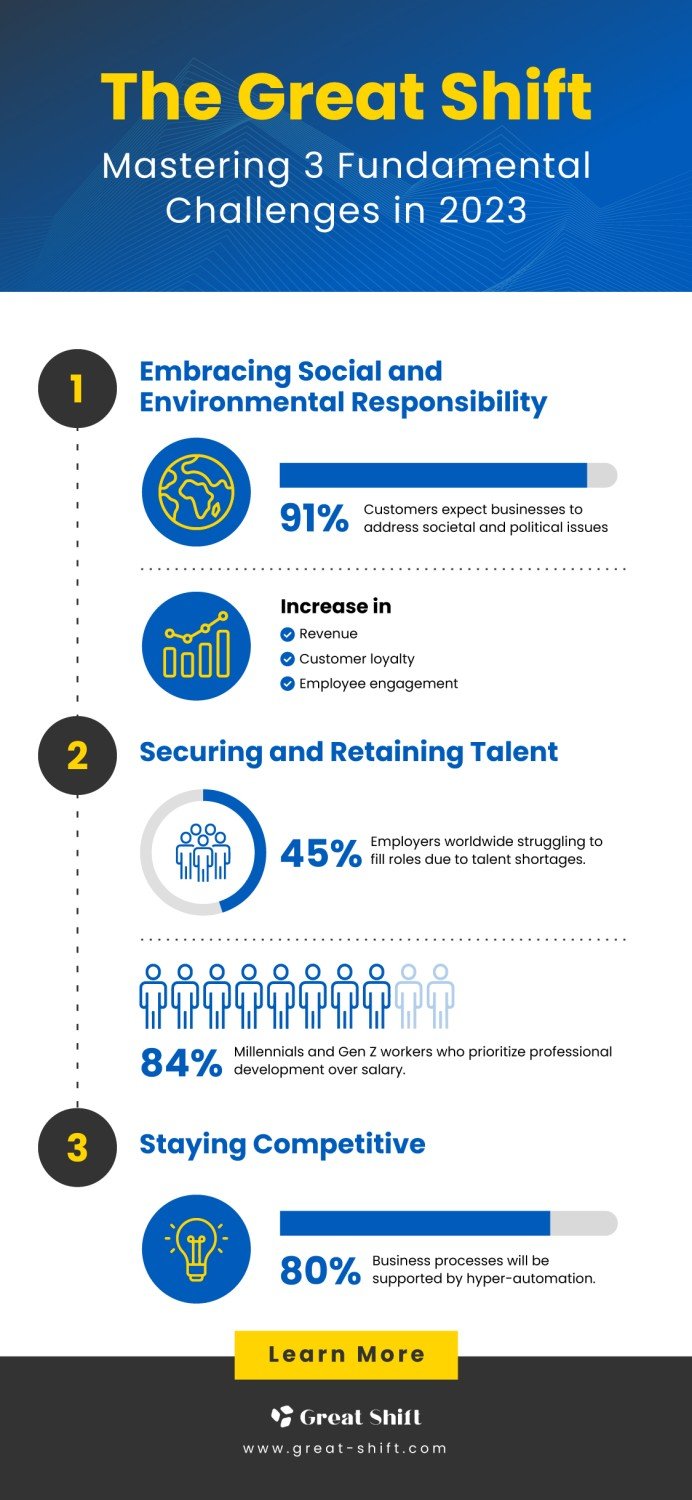In today’s rapidly evolving landscape, businesses are grappling with profound changes that demand innovative responses. Founders, freelancers, and leaders of small to medium-sized enterprises (SMEs) are on the frontlines, adapting their strategies to secure their future. This shift presents three main challenges in 2023: social and environmental responsibility, talent acquisition and retention, and staying ahead in the market. How can your business navigate these challenges successfully?
1. Securing and Retaining Talent
The current competitive job market presents another significant challenge for businesses. A report by ManpowerGroup highlights that 45% of employers worldwide are struggling to fill open roles due to talent shortages. Attracting the right talent and, more importantly, retaining them, is crucial.
A common misconception is that simply offering higher salaries or easing application processes attracts and retains talent. However, studies show that a company’s culture and values, along with opportunities for professional growth, weigh more heavily in job seekers’ decisions. For instance, Deloitte found that 84% of millennials and Gen Z workers prioritize professional development over salary.
As a leader, consider creating an organizational culture that promotes growth, work-life balance, and positive values. Also, monitor your employee churn rate as it could indicate issues that need immediate attention.
2. Staying Competitive
Staying competitive in an era of hyper-automation is a complex task. Gartner estimates that by 2023, 80% of business processes will be supported by at least one form of hyper-automation. To stay afloat, you need to constantly adapt to new technologies, market trends, and shifting consumer preferences.
To foster an innovation culture, focus on developing leadership skills in creativity, problem-solving, strategic thinking, emotional intelligence, and effective communication. Deloitte reports that companies with an innovative culture have leaders willing to take calculated risks and embrace change.
Moreover, fostering a culture of continuous learning and improvement encourages employees to experiment and test new ideas, leading to more innovative solutions.
3. Embracing Social and Environmental Responsibility
In 2023, businesses are under increased scrutiny for their impact on society and the environment. A survey by Cone Communications found that a staggering 91% of consumers expect businesses to address societal and political issues. Failing to meet this expectation risks damaging your brand and losing customers.
To navigate this challenge, consider adopting sustainable practices, promoting diversity and inclusion, and ensuring fair labor practices. Communicating these efforts transparently can boost trust with stakeholders, contributing to a positive brand reputation.
But beyond a reputation boost, being a purpose-led business – one focused on making a positive societal and environmental impact – yields financial benefits. Harvard Business Review reports that companies with a clear purpose record higher revenues, greater customer loyalty, and increased employee engagement. Deloitte found that purpose-led businesses weather economic uncertainties better and bounce back faster than their counterparts. Furthermore, such organizations attract top talents, with almost 80% of millennials indicating that a company’s sense of purpose influences their job acceptance decisions.
Charting the Course for the Future
Companies can decide to act on it or not, either way, the Great Shift is here, and the ability to adapt to social and environmental responsibility, talent retention, and staying competitive will dictate how will be gaining a competitive advantage. In other words, whom we will regard as “the winners”.
As a business coach, my role is to help you navigate these challenges, steering your business toward high performance in a purpose-led, contemporary way.
Whether it’s through coaching and mentoring, providing on-demand/customized training and consulting, or delivering speaking engagements, I’m committed to supporting you in your journey.
If you’re ready to embrace the Great Shift, let’s shape the future of your business together.
Talk soon.
————————————————————————————————————
This article is part of a series of articles I will publish over the next months.
Forward-thinking organizations are orienting their actions not only to their consumers (B2B), other businesses (B2B), or profit but also towards people, purpose, and the planet.
You will also find similar content in my book, The Great Shift.
Have you enjoyed reading this piece?
Then feel free to share it with your network and anyone who can benefit from its content.





